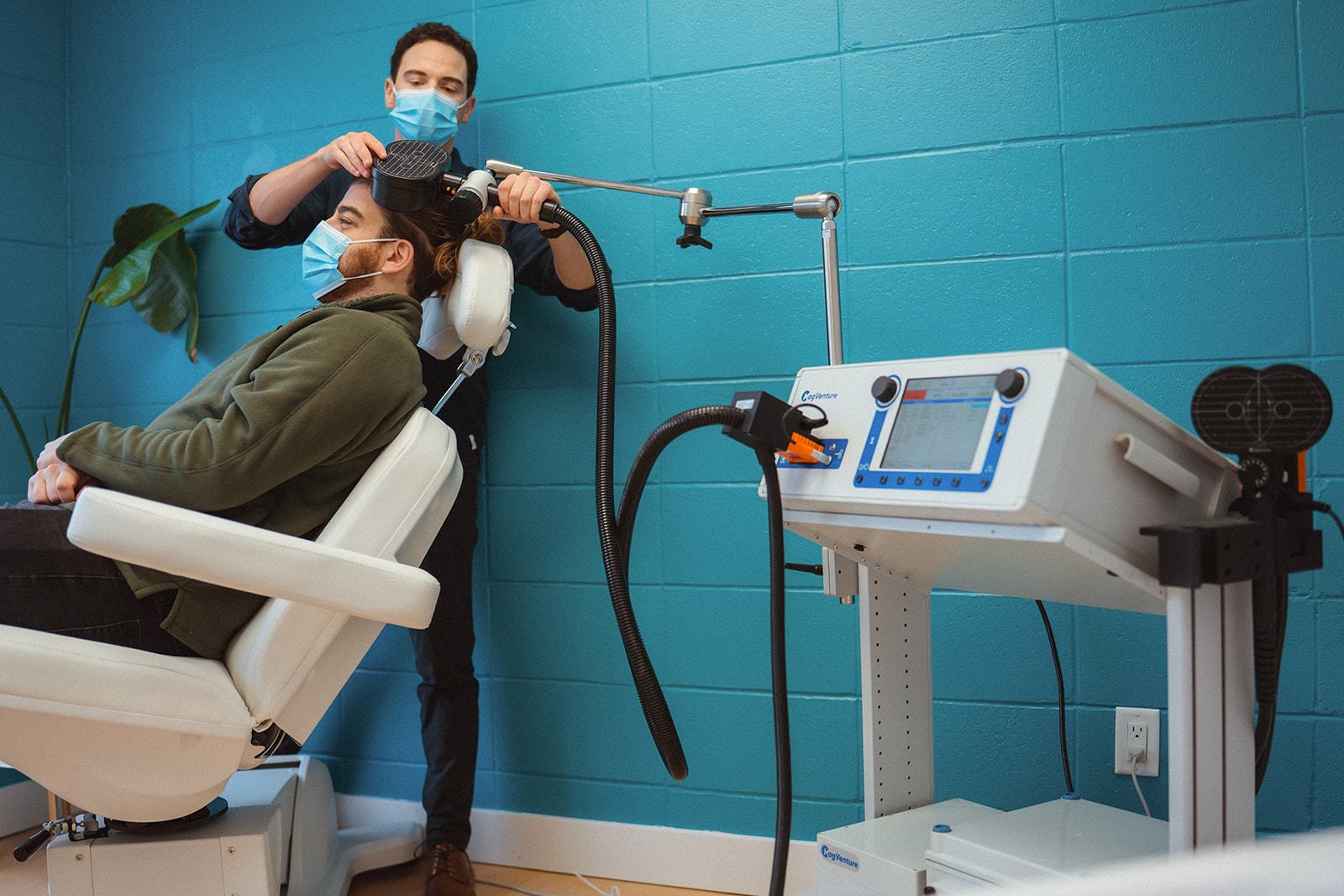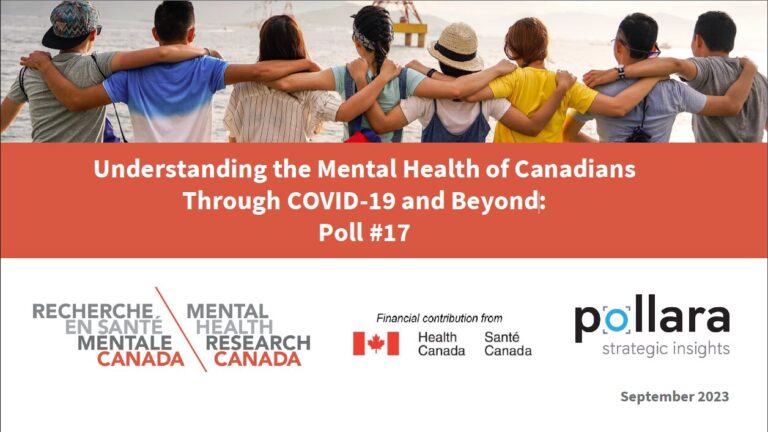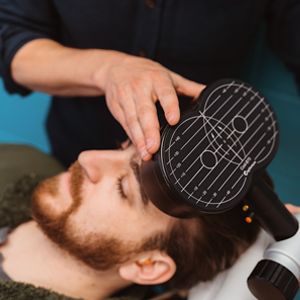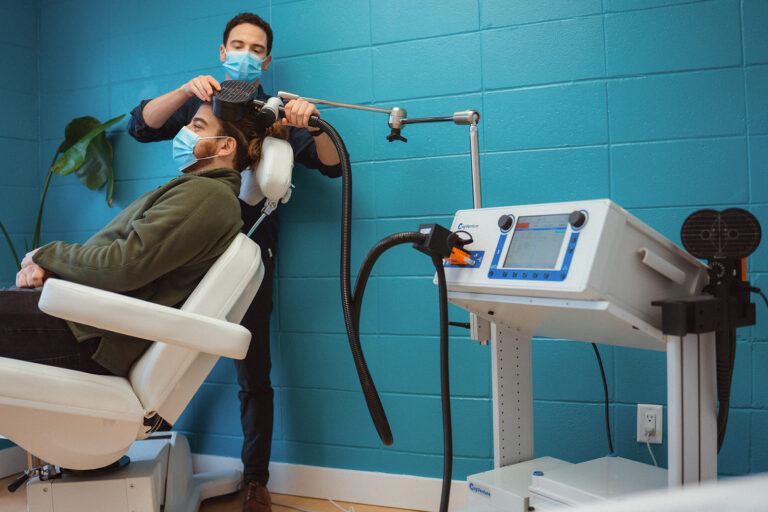Repetitive Transcranial Magnetic Stimulation (rTMS)

Repetitive transcranial magnetic stimulation (rTMS) is a first-line treatment for treatment resistant depression (TRD) based on the Canadian Network for Mood and Anxiety (CANMAT) Guidelines. Approximately 30% of patients with depression are considered to have TRD. Numerous double-blind placebo controlled trials have demonstrated significantly increased response rates with rTMS treatment for TRD.
rTMS is FDA-approved for the treatment of major depressive disorder (MDD) and as an adjunct treatment for obsessive-compulsive disorder (OCD). For MDD, it is indicated after at least one failed antidepressant trial in the current depressive episode. rTMS is used as an adjunct treatment in combination with exposure-response prevention (ERP) therapy and pharmacotherapy for the treatment of OCD. rTMS is also effective in treating anxiety disorders (generalized anxiety disorder, post-traumatic stress disorder) but this is currently considered off-label treatment. rTMS has also been shown to be effective in treating symptoms of depression secondary to traumatic brain injury or concussion.
rTMS uses magnetic pulses to stimulate neuronal pathways in the brain that are altered in mental illness. Although the exact mechanisms of its therapeutic effects is not fully understood, repeated activation of neuronal networks can alter their activity and re-establish balance between circuits. It is also believed to increased the production of brain derived neurotropic factor (BDNF) which helps in the process of neurogenesis and neuroplasticity.
Unlike electroconvulsive therapy (ECT), another neuromodulation treatment for TRD, no anaesthesia is required and the patient is fully conscious during rTMS treatment.
A typical rTMS treatment course is 5 days/week for 6 weeks, for a total of 30 treatments, which may be followed by a tapering and/or maintenance schedule. Treatment time ranges from 3.5 minutes to 30 minutes depending on the protocol used. In certain cases, we also administer an accelerated protocol where a patient receives 50 treatments of intermittent theta-burst stimulation (iTBS) over a 1-2 week period. Throughout treatment, we track response with symptom severity scales.
Repetitive Transcranial Magnetic Stimulation
Accepting Referrals
Information
rTMS uses magnetic pulses to stimulate neuronal pathways in the brain that are altered in mental illness. Patients are fully alert and awake during treatment ( no anaesthesia is required, patients are able to drive home and return to their regular duties)
A typical treatment protocol is 5 days per week for six weeks, however we also offer accelerated protocols (iTBS) where treatment can be safely and effectively delivered in a shorter time period (1-2 weeks) by administering multiple treatments per day. Following the index course, we may recommend a gradual tapering schedule based on your individual needs.
Patient Eligibility
(must meet all criteria)
- Diagnosis of major depressive disorder, post-traumatic stress disorder, obsessive-compulsive disorder, generalized anxiety disorder or depression secondary to traumatic brain injury/ concussion.
- No non-removable metallic hardware or devices in the head region (cochlear implants, deep brain stimulators, foreign metal fragments, etc.). Dental hardware is acceptable
- Not acutely suicidal (requires higher level of care)
- Depression and anxiety symptoms not deemed to be primarily caused by substance use
- No severe active substance use issues
Resources
rTMS treatment is not covered by Alberta Health Insurance (AHI) at this time and is therefore a private pay treatment. Dr. Comeau is a registered provider with Veteran’s Affairs (VA). Some disability and insurance companies may provide coverage, we recommend that you enquire with your provider to see if you are eligible for funding.
Magnetic Insights:
Explore the Power of Repetitive Transcranial Magnetic Stimulation (rTMS)
Unlocking the Potential of Repetitive Transcranial Magnetic Stimulation (rTMS) – Your Gateway to Innovative Psychiatric Therapy. Dive into the latest research, success stories, and expert insights.

Understanding the Mental Health of Canadians Through COVID-19 and Beyond
Understanding the Mental Health of Canadians Through COVID-19 and Beyond Methodology: This online survey was conducted among a sample of 3,819 adult Canadians. This was the seventeenth poll of this study (see below). Results between the polls are compared where applicable. Weighting: National results have been

rTMS Response & Remission Rates (Based on BDI-II)
The Transformative Impact of rTMS and Psychiatric Care on Treatment-Resistant MDD Patients In the realm of psychiatric care, where traditional treatments may falter, innovative approaches offer new avenues of hope. Among these, Repetitive Transcranial Magnetic Stimulation (rTMS) has emerged as a

Repetitive Transcranial Magnetic Stimulation (rTMS) for PTSD
Repetitive Transcranial Magnetic Stimulation (rTMS) for PTSD Each and every experience we have throughout our lives, good or bad, leaves its mark on our brain, body, and mind. Our environment is constantly changing, and it is the purpose of our bodily senses to collect that

